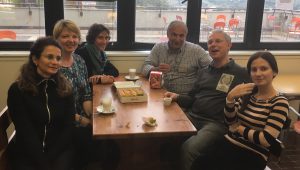As part of the iSAGE project, focus groups will be conducted in Spain, Finland, France, Greece, Italy, Turkey, and the United Kingdom to explore consumers awareness, attitudes and preferences towards livestock-based food products (meat, dairy) as well as overall consumer acceptance of goat and sheep animal products.
For the project, iSAGE will utilise the research interviewing technique called laddering which helps to elicit the underlying core values and beliefs of those being interviewed. Used in conjunction with the Means End Chain theory, which assists in describing the links between the interviewer’s values and his/her purchasing behavior, these two methods can assist the iSAGE project to better understand the consumers of the goat and sheep sector.

Workshop participants
Two training workshops were held in Ancona (Italy) to work with selected interviewers to illustrate and to review focus group research methodology (moderation tips and analysis), best practices as well as to provide specific instructions on data collection and coding. The first training workshop took place from October 5th-6th while the second workshop took place from October 13th-14th 2016.
For both workshops, Prof Raffaele Zanoli, from the Università Politecnica delle Marche, began by giving an introduction on how to conduct a focus group and going over the moderator’s toolkit, information and materials. The draft version of the focus group guidelines were tested using a role-playing methodology and then discussed. Dr Susanne Padel, from the Organic Research Centre, provided her experience as moderator during the first workshop role-playing session. As part of the role-playing session, each participant was asked to complete a draft version of the questionnaire.
The second day of workshops focussed on Means End Chain and laddering methodology. Prof. Simona Naspetti explained the use of laddering to collect in-depth insights on consumer motivations and barriers to purchase. She also provided practical and essential material on how to conduct a Means End Chai analysis.
Finally, organisational issues were discussed in each workshop to improve the efficiency of the work.




 This project has received funding from the European Union's Horizon 2020 research and innovation programme under grant agreement No 679302.
This project has received funding from the European Union's Horizon 2020 research and innovation programme under grant agreement No 679302.